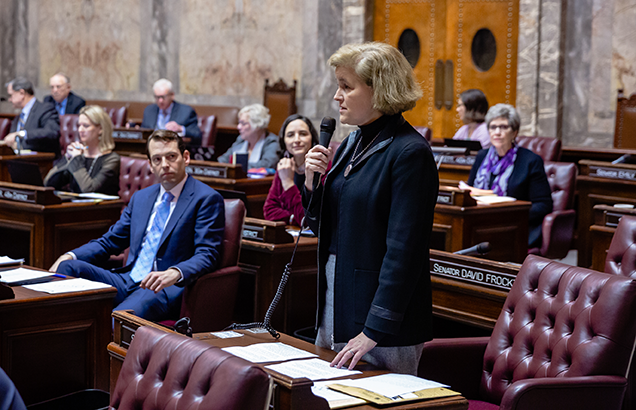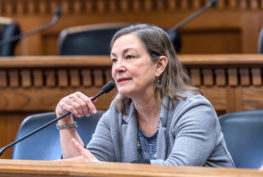OLYMPIA – The 2020 supplemental operating budget (SB 6168) passed today by the Senate directs an additional $115 million to critical investments to address the state’s homelessness crisis.
The Senate proposal was approved on a 33-16 vote and includes nearly $1 billion in new spending overall, including significant increases for childcare and early learning as well as a historic investment to speed up financing and construction of the new UW Medicine Behavioral Health Teaching Facility.
“With this budget, we are able to address three of the biggest challenges our state faces — affordable housing and homelessness, behavioral health, and climate change,” said Christine Rolfes (D-Bainbridge Island), chair of the Senate Ways & Means Committee and chief budget writer. “This is a realistic, sustainable and responsible budget that will make a difference in people’s daily lives while also leaving the state in a historically strong fiscal position.”
The proposed budget supplements the $52.4 billion, two-year budget passed by lawmakers last year while reserving $2.9 billion in the state’s rainy day fund to guard against a downturn in the economy.
The budget also includes an additional $10 million – with flexibility built in – to support local health officials as they prepare to respond to the global coronavirus outbreak.
“We have strengthened funding for foundational public health over the last several years, and we build in flexibility to ensure our health departments have the resources they need to respond to any public health threat,” Rolfes said.
Other highlights of the budget include additional funding for K-12 special education programs, election security, rural health clinics, and nursing homes.
Highlights of the 2020 Supplemental Budget Proposal
The Senate proposal invests $315 million in one-time revenue projected in the February forecast, including:
- $115 million to address homelessness by increasing shelter capacity and keeping vulnerable families housed.
- $100 million to address the climate crisis by investing in communities and projects to enhance mitigation and resiliency.
- $100 million toward a new UW Behavioral Health Hospital, which lawmakers approved in 2019 to address a workforce shortage and a lack of adequate beds for patients.
Several other funding increases include:
- $128 million in K-12 education dollars for local levy assistance ($46M), special education ($21M), pupil transportation ($41M), paraeducator training ($12M), and other increases.
- $184 million in health care dollars for managed care ($61M), primary care physician rate increases ($10M), rural health clinics ($34M), family planning ($8M), and other increases.
- $116 million to the state Dept. of Children and Families to reduce childcare rates for working families ($27M), strengthen the foster care system ($20M), expand early learning programs ($5M), and other increases.
Other budget items of note include:
- $33.7 million to support struggling nursing homes by increasing Medicaid reimbursement rates.
- $20 million for wildfire suppression and prevention.
- $10 million for enhanced election technology and security.
- $10 million to cover the costs associated with the coronavirus outbreak, including a dedicated call center, monitoring, and support for local health jurisdictions.
Click here to find budget documents and summaries.
About the Supplemental Budget
Supplemental budgets are passed in even years and allow the state to make mid-course corrections to the two-year budgets passed in odd years. It gives the state the opportunity to adjust spending to keep families safe, provide high-quality education, and address other emergent needs like mental health care.





